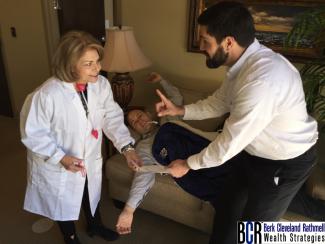
Life Lessons Learned
This blog provides advice from a client, recently retired from the healthcare industry, who has firsthand experience in being a patient advocate and caregiver for his wife.
Dan and Carol, not their real names, recently retired to a quaint southern town that is a haven for youthful and active retirees by providing a wide range of athletic and cultural opportunities.
As Dan said, I guess every Paradise has a snake or two and one bit us this past Friday morning. Here’s his advice gained from 6 weeks of patient advocacy:
Dear Family & Friends,
As most of you are aware, Carol had a bad fall from her horse a little over two weeks ago which placed her in the hospital for six days, followed by an outpatient surgery, and then, on October 24th, admission to the Rehabilitation Facility where she is expected to stay until mid-November.
These admissions have taught us some lessons that I’d like to pass along to you.
Although none of us would like to think about entering a hospital, the reality is it is just a matter of time before it will happen - either to you or someone close to you. So, please learn from our experience.
- First, think about what you’re doing at all times and avoid discounting any situation that could turn into a serious injury in an instant.
- Determine now at which hospital you would like to be treated. Do some investigation of area facilities by looking at online reviews and asking friends/family of where they have gone for medical care. Otherwise, you’ll be taken to the nearest hospital which may not be the best one. If severely injured, go to a Trauma Center (which may not be your first choice in a less severe situation) where they have all medical specialties on stand-by 24 hours a day.
- In addition, determine who is your Emergency Contact person. I’ve created a slip of paper that we have conspicuously placed in our wallets indicating two levels of contact information – primary (one of us) and a secondary (in case we are both injured at the same time).
- Your primary care physician (PCP) will not be treating you while in the hospital. Hospitals now employ what are termed “Hospitalists” who are specialists in this type of care and will be assigned to you as your attending physician. Like nurses, they may work three 12-hour shifts so you may have to deal with multiple Hospitalists. If they need to bring in a specialist (Cardiologist, Surgeon, etc.), you might be able to have a say in selecting them. So again, do your research ahead of time or rely on your PCP for a suggested referral. Keep in mind though your PCP is usually affiliated with a specific area medical group and may not suggest the “best” one in town.
- Both the patient and their caregiver must become proactive from the very beginning of care and continue through full recovery. This really needs to be a joint effort as the caregiver cannot be there 100% of the time.
- Although you’re not a doctor or nurse, you do know much more than you may think regarding how and when a patient should be treated. Be proactive by asking questions as to what is being done for them as well as why. While you need to be assertive, be nice at the same time.
- Communication is a two-way street. If you do not understand something, ask about it. If you do not agree with what is being said, state your concerns directly and to the point. If you do not get an acceptable answer, take charge and go up to the next level of authority.
- Understand that all of the staff (doctors, nurses, aids, etc.) are caring for many patients. While they all have good intentions, your patient is the one you want taken care of properly. So, you may have to nicely ask (insist) on their assistance. In addition, they really do want your participation as it often helps them.
- Always be gracious. Tell the caretaker “Thanks” as well as what a good job they’ve been doing. It goes a long way toward getting good care.
- While many doctors may think they are God, they are not. Ask them to explain the situation in layman’s terms. Remain on an equal footing with them as you are just as important as they are. They certainly have great expertise, but there are generally multiple solutions to any problem so ask for options. You also always have the option of obtaining a second opinion.
- Finally, review and understand your health insurance plan. You may be surprised it will not cover much of a hospitalization due to a high deductible or by the hospital being out of network. If so, set up a savings program now. Many people have to seek bankruptcy due to unplanned medical expenses. In addition, determine what services require that you obtain prior approval. Otherwise, you may be stuck with a large and unexpected medical bill that could have been avoided.
I know some of this will require effort and time on your part, but by being prepared both physically as well as mentally it will make a difficult situation much easier to handle.
Dan

